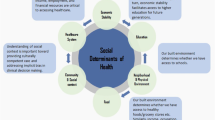Abstract
The public’s view on how poverty and health are related will influence support for different policies and programs. The purpose of this study was to examine public perceptions of the relationship between poverty and health and to identify demographic variables that predict support for the four explanations of the relationship between poverty and health (artifact, drift, behavioural, and structural) first identified in the Black Report in the United Kingdom. A telephone survey of a representative sample of Albertans (N=1,216) was conducted. The majority of respondents believed that poverty leads to poor health. The explanation that health is influenced by the context in which individuals live (structural) received the most support. Demographic variables (sex, age, education, occupation, income, residence, conservatism) explained less than 10% of the variance for each of the four explanations, with conservatism the most consistent predictor.
Résumé
l’opinion publique sur les liens qui existent entre la pauvreté et la santé influence le degré de soutien donné aux politiques et programmes gouvernementaux. Le but de cette étude était d’examiner les perceptions du public en ce qui a trait au lien entre la pauvreté et la santé et d’identifier les variables démographiques qui prédisent le soutien aux hypothèses proposées dans le rapport Black qui fut publié au Royaume-Uni. Un sondage téléphonique fut complété auprès d’un échantillon représentatif d’Albertains (N = 1 216). La majorité des répondants croient que la pauvreté conduit à une santé précaire. l’hypothèse selon laquelle la santé est influencée par le contexte dans lequel vivent les gens (hypothèse structurelle) a obtenu le plus grand soutien. Les variables démographiques (genre, age, éducation, occupation, revenu, résidence et conservatisme) expliquent moins de 10% de la variance pour chacune des quatres hypothèses. Le conservatisme est la variable prédicative la plus fidèle.
Similar content being viewed by others
References
Canadian Public Health Association. Health Impacts of Social and Economic Conditions: Implications for Public Policy. Ottawa: CPHA, 1997.
Amick B, Levine S, Tarlov A, Cameron Walsh D. Society and Health. Oxford: Oxford University Press, 1995.
Blackburn C. Poverty and Health: Working with Families. Philadelphia: Open University Press, 1991.
Evans B, Barer M, Marmor T (Eds.). Why Are Some People Healthy and Others Not? The Determinants of Health of Populations. New York: Aldine DeGruyter, 1994.
Whitehead M. Tackling inequalities: A review of policy initiatives. In: Benzeval M, Judge K, Whitehead M (Eds.), Tackling Inequalities in Health: An Agenda for Action. London: King’s Fund, 1995;22–52.
Epp J. Achieving Health for All: A Framework for Health Promotion. Ottawa: Health and Welfare Canada, 1986.
Federal, Provincial, and Territorial Advisory Committee on Population Health. Report on the Health of Canadians. Ottawa: Health Canada, 1996.
National Forum on Health. Canada Health Action: Building on the Legacy. Volume 1. Ottawa: Public Works and Government Services, 1997.
Benzeval M, Judge K, Whitehead M. Introduction. In: Benzeval M, Judge K, Whitehead M (Eds.), Tackling Inequalities in Health: An Agenda for Action. London: King’s Fund, 1995;1–9.
Canadian Public Health Association. Action Statement for Health Promotion in Canada. Ottawa: Author, 1996.
Iyengar S. How citizens think about national issues: A matter of responsibility. Am J Political Science 1989;33:878–900.
Kluegel J. Macro-economic problems, beliefs about the poor and attitudes toward welfare spending. Soc Probl 1987;34:82–99.
Kluegel JR, Smith ER. Beliefs about Inequality. Hawthorne, NY: Aldine de Gruyter, 1986.
Millar J. Public policy, health policy, healthy public policy: What’s the difference? In: Healthy Public Policy Development—Science, Art, or Chance? Conference Proceedings. Saskatoon: Saskatchewan Provincial Health Council, Prairie Region Health Promotion Research Centre, University of Saskatchewan, Saskatoon, Saskatchewan, 1996;1–6.
Wilson G. Toward a revised framework for examining beliefs about the causes of poverty. The Sociological Quarterly 1996;37:413–28.
Naidoo J, Wills J. Health Promotion: Foundations for Practice. London: Bailliere Tindall, 1994.
Department of Health and Social Security. Inequalities in Health: Report of a Research Working Group (The Black Report). London: Department of Health and Social Security, 1980.
Blane D. An assessment of the Black Report’s ‘explanations of health inequalities.’ Sociol Health Illn 1985;7:423–45.
Marmot M, Kogevinas M, Elston M. Social/economic status and disease. Annu Rev Public Health 1987;8:111–35.
Wilkinson R. Unhealthy Societies: The Afflictions of Inequality. London: Routledge,1996.
Williams D. Socioeconomic differentials in health: A review and redirection. Soc Psychol Q 1990;53:81–99.
Graham H. Women and smoking in the United Kingdom: The implications for health promotion. Health Prom 1989;3:371–82.
Stewart M, Gillis A, Brosky G, et al. Smoking among disadvantaged women: Causes and cessation. Can J Nurs Res 1996;28:41–60.
Travers K. The social organization of nutritional inequities. Soc Sci Med 1996;43:543–53.
Link B, Phelan J. Social conditions as fundamental causes of disease. J Health Soc Behav 1995; Extra Issue:80–94.
Labonte R. Health Promotion and Empowerment: Practice Frameworks. Issues in Health Promotion Series #3. Toronto: Centre of Health Promotion, University of Toronto & ParticipACTION, 1993.
Marmot M, Bobak M, Davey Smith G. Explanations for social inequalities in health. In: Amick B, Levine S, Tarlov A, Cameron Walsh D (Eds.), Society and Health. Oxford: Oxford University Press, 1995;172–210.
Fong D. The 1996 Alberta Survey Sampling Report. Edmonton: Population Research Laboratory Department of Sociology, University of Alberta, 1996.
National Council of Welfare. Poverty Profile. Ottawa: Supplies and Services, 1997.
Zucker G, Weiner B. Conservatism and perceptions of poverty: An attributional analysis. J Appl Soc Psychol 1993;23:925–43.
Bobo L. Social responsibility, individualism, and redistributive policies. Sociological Forum 1991;6:71–91.
Hasenfeld Y, Rafferty J. The determinants of public attitudes toward the welfare state. Social Forces 1989;67:1027–48.
Blaxter M. Whose fault is it? People’s own conceptions of the reasons for health inequalities. Soc Sci Med 1997;44:747–56.
Author information
Authors and Affiliations
Corresponding author
Additional information
This research was supported in part by the Faculty of Nursing Internal Allocation Fund, University of Alberta; the Population Research Laboratory, Department of Sociology, University of Alberta; and the Alberta Public Health Association.
Rights and permissions
About this article
Cite this article
Reutter, L., Neufeld, A. & Harrison, M.J. Public Perceptions of the Relationship between Poverty and Health. Can J Public Health 90, 13–18 (1999). https://doi.org/10.1007/BF03404091
Received:
Accepted:
Published:
Issue Date:
DOI: https://doi.org/10.1007/BF03404091




